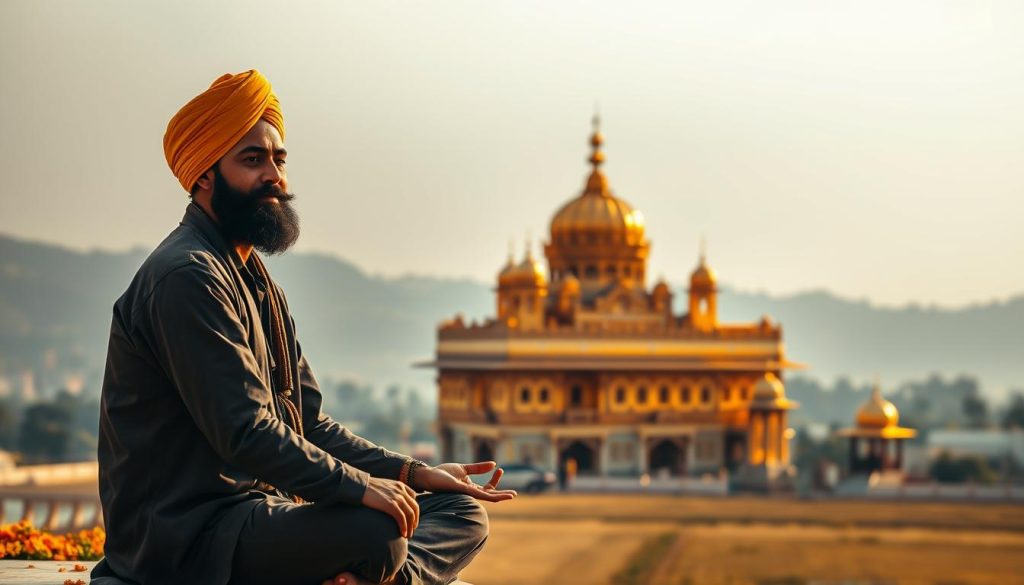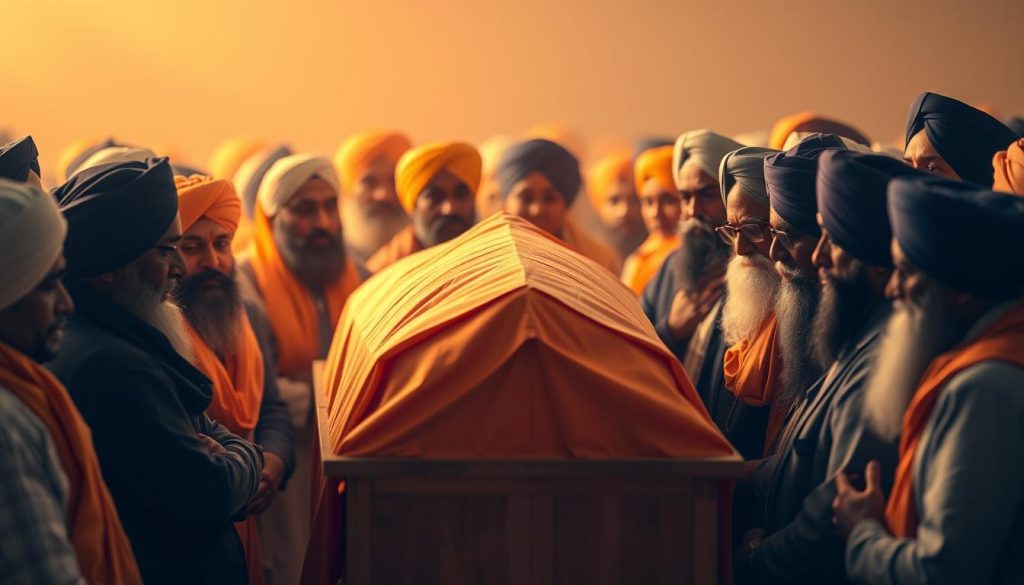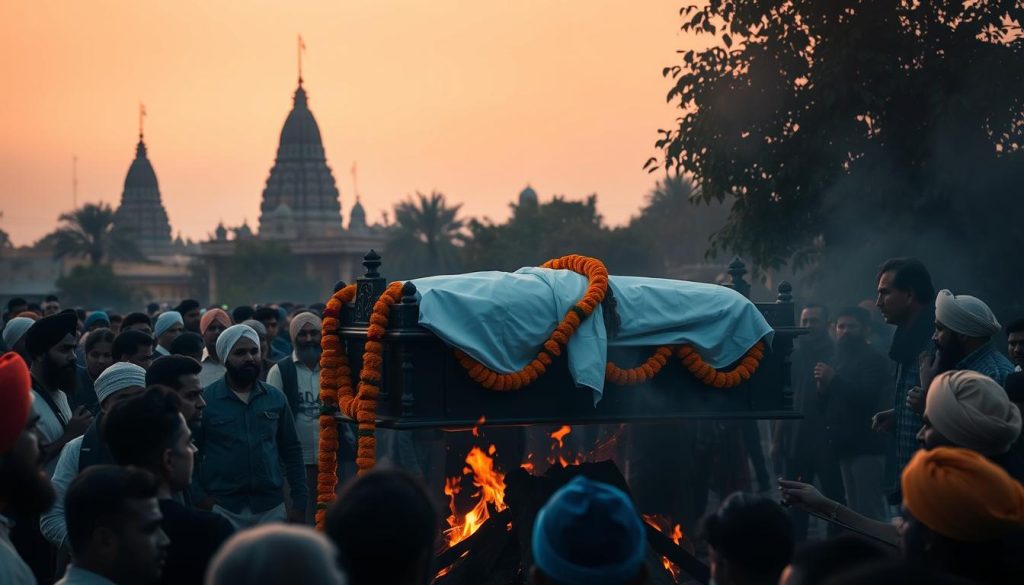Understanding Sikh Beliefs about Death
May 26, 2025
Death affects us all deeply. It can happen when we lose someone or think about our own life ending. But Sikhs see death as not the end, but part of a bigger journey for the soul.
When my grandmother died, we felt peace from Sikh teachings. We saw her death as not the last goodbye. Instead, it was a big step on her spiritual path. This helped us find peace and understanding, knowing she was going to meet the Divine.
According to Sikhism, life and death are parts of how our soul grows. This growing happens through many lifetimes. The biggest goal is to break free from this cycle. Then the soul can join with Waheguru (God). This idea gives our lives purpose and helps us see why we do what we do.
Sikhs try to live well every day. They focus on being honest and spiritual. This doesn't just help now, but also in what comes after. The connection between how we live and our soul's future is a key part of Sikh beliefs about the afterlife.
Key Takeaways
- Death in Sikhism is viewed as a continuation of the soul's journey, not an end.
- The cycle of birth and rebirth (samsara) is central to Sikh beliefs.
- The ultimate goal is liberation (mukti) to merge with the Divine.
- Sikhs live by virtues like honesty and spirituality, impacting both life and the hereafter.
- Understanding Sikh beliefs about death provides comfort and purpose in life's most challenging moments.
Overview of Sikhism and Its Core Teachings
Sikhism is a faith from the Punjab region. It teaches us to live ethically and seek spiritual truth. At its heart is the belief in one God, called 'Ik Onkar'. This idea is very important in Sikhism.
The Concept of Ik Onkar in Sikh Beliefs
'Ik Onkar' means "One Reality". It shows that God is one and connects all life. This belief teaches Sikhs to include everyone and treat all people equally. It leads to a life of harmony and respect for every living thing.

Importance of the Guru Granth Sahib
The Guru Granth Sahib is the holy book of Sikhism. It is seen as the eternal Guru. It contains teachings for living a good life and staying close to God. Sikhs learn to live with honesty, help society, and have a strong faith.
Key Principles of Sikh Philosophy
Sikhism's beliefs are based on three main ideas. Naam Japna is about always remembering God. Kirat Karni means living honestly and making good choices. Vand Chakna teaches us to share with others, which helps the community. These ideas help Sikhs live with truth, kindness, and modesty.
Death as a Natural Process in Sikhism
In Sikhism, death is a key part of life's journey. It's not seen as the end but as a step to the next phase of the spiritual path. Sikhs believe this makes it easier to face death, bringing peace of mind.
Sikh View on Life and Death
Sikhs strive to live righteously, with honesty and devotion to God. They see the soul as eternal. When someone dies, only their body stops existing. The soul goes on, moving according to God's will. This view helps Sikhs see death as a natural event, not something to fear.

The Cycle of Birth and Rebirth (Reincarnation)
Reincarnation is central to Sikh beliefs, linked to the samsara cycle. According to Sikhism, our souls go through many lives, shaped by our actions. This cycle of birth, death, and rebirth goes on until purity and unity with God are achieved. It's viewed not as punishment but as a chance for spiritual growth and freedom.
| Key Concept | Details |
|---|---|
| Immortality of the Soul | The soul is eternal and transitions from one life to another. |
| Cycle of Samsara | The continuing cycle of birth and rebirth, driven by karma. |
| Reincarnation Beliefs | The notion that the soul reincarnates based on past actions. |
Importance of Seva and Community Support at Death
When someone passes away, the Sikh community comes together. They offer support and show kindness. This reflects Sikhism's core values. Seva, or helping others without wanting anything in return, is very important. It helps those who are grieving feel less alone. The whole community works together to give emotional and spiritual support.

At Sikh funerals, family members are very important. They make sure the rituals are done with respect and love.
The Role of Family in Sikh Funerals
Families are key in Sikh funeral traditions. They plan the service and join in prayers. They often read from the Guru Granth Sahib. This makes everyone feel peaceful and keeps their faith strong. The family's role is very important. It shows they care and respect the person who has died.
Community Involvement in Mourning Practices
The Sikh community's support is special when someone dies. Everyone helps out in many ways. They cook and serve food, offer comfort, and say prayers together. This shows how important it is to support each other. Everyone helps, so no one has to be sad alone. Through Seva, the community shows its kindness. Supporting each other is everyone's job, not just the family's.
The true measure of a community's strength is shown in its unwavering support and kindness during difficult times.
The Rituals Surrounding Death in Sikhism
Sikhism sees life and death as important. The end-of-life ceremonies are very special. They help honour those who have passed away. They also offer comfort to family and friends. These Sikh rituals for the departed show the cycle of life. They help us understand the Sikh belief in accepting God's will.
Antim Sanskar: The Last Rites
Antim Sanskar is the last rite in Sikhism. It is very important. It shows the community's care in saying goodbye. This ritual helps the soul find peace. It matches spiritual and cultural beliefs.

Cremation Practices and Significance
In Sikhism, burning the body is common. Sikh cremation rituals mean the soul leaves the body. The body goes back to nature. This act reminds us life is short. It shows belief in life after death. It follows Sikh teachings.
The Role of Kirtan and Prayers
Kirtan means singing holy songs. It's key in Sikh rituals for the departed. These songs have deep meanings. They touch the hearts of those who mourn. Kirtan during last rites brings God closer. It lifts the spirits of the family. These songs and prayers help Sikhs accept and find peace in loss.
Views on Afterlife in Sikh Beliefs
Sikh afterlife beliefs are deeply connected to their spiritual views. They don't see the afterlife as just reward or punishment. It's more about the journey to become one with the divine.

Union with the Divine
Reuniting the soul with Waheguru, the Supreme Being, is the ultimate goal for Sikhs. This marks the end of rebirths and brings eternal joy. Sikhism talks more about melding with Waheguru than a specific place for afterlife.
The Concept of Spiritual Liberation (Mukhti)
Mukhti, or spiritual liberation, is key in Sikhism. It comes from remembering God’s name, serving others, and living right. This breaks the cycle of birth and rebirth. Focusing on God, helping selflessly, and following a moral path lead a Sikh back to the divine.
"Those who have the treasure of Naam are liberated. By Guru's Grace, they easily merge in Truth."
Heaven and Hell in Sikh Philosophy
In Sikhism, heaven and hell are not places but states of being. Heaven is being one with God and feeling joy. Hell is feeling lost and sad because of selfish acts and ignorance. Sikhs believe in doing good and growing spiritually now to free their soul later.
For more info on how Sikhs view death and the afterlife, check out more here.
Mourning Practices and Grieving in Sikhism
Mourning in Sikh culture shows deep respect for life and its brief nature. It's based on Sikh teachings. They support both the person and the group when there's a loss. This approach highlights life's temporary aspect.
The Length and Nature of Mourning Periods
The mourning time in Sikhism involves several rituals. These help in accepting the deceased's passing. The duration varies but focuses on quiet reflection, prayers, and readings from the Guru Granth Sahib. These acts bring comfort and strengthen faith in God's plan.
Role of the Sangat (Community) in Mourning
The Sikh community, or Sangat, is key in providing grieving support. They come together for Kirtan and recitations. This helps the grieving understand and manage their sorrow. It brings everyone closer, showing no one is alone in their grief.
Emotional Expression and Acceptance
Sikh customs encourage showing one's feelings openly. It's okay to feel sad or even to accept the loss. These practices help people accept their feelings without shame. They're seen as important steps in dealing with and understanding loss.
Understanding Karma and Its Impact on Death
Karma is very important in Sikhism. It affects life and death. Sikh beliefs about karma say our actions affect our soul's journey. Sikhs try to live well, being kind and fair. This helps them in the cycle of rebirth.
Significant Role of Karma in Life and Death
In Sikhism, the word "karma" means action. It's about cause and effect. Our actions in life decide our future and rebirth. Sikh beliefs about karma tell us to follow a moral code.
How Actions Influence Rebirth
Karma means our actions leave marks on the soul. Good deeds can lead to a better next life. They help the soul grow and find peace. But, bad actions add bad karma. This keeps the soul in the rebirth cycle. Life actions and rebirth in Sikh teaching show the value of living with awareness and kindness.
So, karma's influence is big. It's not just about what we do. It's how Sikhs see their life and goal. They use karma to find a balance between actions and their next life.
The Significance of Naam in Preparing for Death
Naam, or remembering God's name, is very important in Sikh beliefs. It helps when one is getting ready for death. It makes the soul move towards divine consciousness. This brings a sense of peace and gets one ready for what comes after life.
Chanting and Meditating on God's Name
Chanting and thinking deeply about God's name every day makes life calm and reflective. This practice aligns the mind with spiritual goals. It also cleanses the soul, which is vital when getting ready for death in Sikhism. By always remembering Naam, the soul stays focused on what's important. This helps ensure a peaceful change.
Spiritual Preparations for the End of Life
As the end of life nears, Sikh teachings stress getting ready spiritually. People are encouraged to chant, meditate, and think about God's name. They also learn to ignore ego and worldly desires. Getting ready for death in Sikhism is a full journey. The soul aims for freedom and to join with the Divine through Naam's importance.
Gender Roles in Death Practices
In Sikh traditions, both men and women share duties when someone dies. This sharing shows everyone is equal and belongs. The rituals bring people together.
Men's and Women's Responsibilities
In these traditions, men and women have different but important roles. Men do things like making the pyre for cremation. Women help by supporting the family with love and prayer.
But these roles can change. They depend on the family and where they are from. Everyone, no matter if they are a man or a woman, prays and sings together.
Cultural Interpretations Influencing Rituals
Where Sikhs live can change how they do things when someone dies. Sometimes, women lead the planning and cooking. Other times, men lead the singing and praying.
This shows that while Sikhs believe in equality, their culture also plays a big part. Each group does things in its own way, keeping to their main beliefs.
Sikh Perspectives on Death and Grief Counselling
Sikhism views death with compassion and stresses the importance of togetherness and spiritual backing. The community and various practices play a big part in helping people not feel alone in their sadness. Things like being together, praying, and remembering the person who has died are very important.
Importance of Supportive Practices
Being supportive is key in Sikhism for helping those who are sad find peace and comfort. Guidance comes from the Guru Granth Sahib, offering solace to those in need. Doing things like saying prayers, thinking deeply about God, and singing religious songs can really help someone who is grieving.
Sikh Leaders and Their Role in Helping the Bereaved
Leaders in Sikhism play a big role in providing support. Sikh Helpline Granthis and other leaders don't just carry out religious duties; they also understand and guide each person through their loss. They are key in making sure people get the full support they need. Services like the Sikh Helpline are always there to help, offering spiritual and practical advice anytime.
Comparative Analysis with Other Religious Views on Death
Sikhism, Hinduism, and Buddhism are alike in many ways about death and what comes after. They all come from the Indian subcontinent. But Sikhism has its own special traits that make it different. Through comparative religious studies, we explore these similarities and differences.
Similarities with Hindu and Buddhist Beliefs
*Sikhism vs Hinduism and Buddhism* both think that reincarnation and karma are real. These ideas mean our actions impact our next life. In Hinduism, the soul goes through many lives. Buddhism believes in a cycle of life and death, which karma moves along. These views show why living a good life is key to a better next life.
Unique Aspects of Sikhism
Even with these shared beliefs, Sikhism has its own unique Sikh beliefs. It says living as God wishes is how to be free. This idea is a big part of Sikh life. It connects everyday life with spirituality. The Antam Sanskaar ceremony, seen here, shows this belief in action at death.
Also, in Sikhism, community support is important when someone dies. This shows how they value being together and helping each other. The Five Ks are kept even in death rituals. This shows a Sikh's lasting dedication to their beliefs. These practices and the emphasis on joining with the divine make Sikh death rituals unique.
Conclusion: The Embracing of Life and Death in Sikh Philosophy
Sikh beliefs give us a deep look at life and death. They teach death as a sacred step in our soul's journey. The Guru Granth Sahib shows the importance of living a good life that includes doing right, helping others, and spiritual dedication.
Summary of Key Points
Sikhism sees death as part of the divine plan. It teaches us to accept life's short nature while growing spiritually. The ideas of karma and seva stress living with good actions and helping the community. Rituals like Antim Sanskar and the role of the Sangat highlight how we come together in grief and support.
The Eternal Nature of the Soul
Sikh teachings tell us about the soul's eternal nature. This thought brings comfort and purpose, pushing us to live with meaning as we ready for our spiritual journey beyond. By chanting Naam and practicing meditation, Sikhs connect deeply with the divine. This makes the move from this life to the next honored and smooth.
The lessons from Sikhism teach us that accepting death is key to spiritual freedom and achieving solace. The eternal nature of the soul is central, offering comfort and guidance to believers.
FAQ
What are the Sikh beliefs about death?
Can you explain the concept of Ik Onkar in Sikh beliefs?
What is the importance of the Guru Granth Sahib in Sikh practices?
How do Sikhs view the cycle of birth and rebirth?
What role does Seva (selfless service) play at the time of death?
What are Antim Sanskar and its significance in Sikhism?
How do Sikhs perceive the afterlife?
What are the mourning practices and customs followed in Sikhism?
How does karma influence the Sikh perspective on death?
What is the significance of Naam in preparing for death?
What roles do men and women play in Sikh death practices?
How do Sikh leaders support the bereaved?
What are the similarities and differences between Sikhism and other religions regarding death?
Providing generations of care, with tradition trust and guidance
Locations We Cover
Aldridge | Bilston |Birmingham | Blackheath | Bloxwich | Brierley Hill | Brownhills | Coseley | Coventry | Darlaston | Dudley | Halesowen | Kingswinford | Oldbury | Rowley Regis | Royal Sutton Coldfield | Sedgley | Smethwick | Solihull | Stourbridge | Sutton Coldfield | Tipton | Walsall | Wednesbury | West Bromwich | Willenhall | Wolverhampton
17 Liskeard Road
Park hall
West Midlands
WS5 3EY
01922 438503

